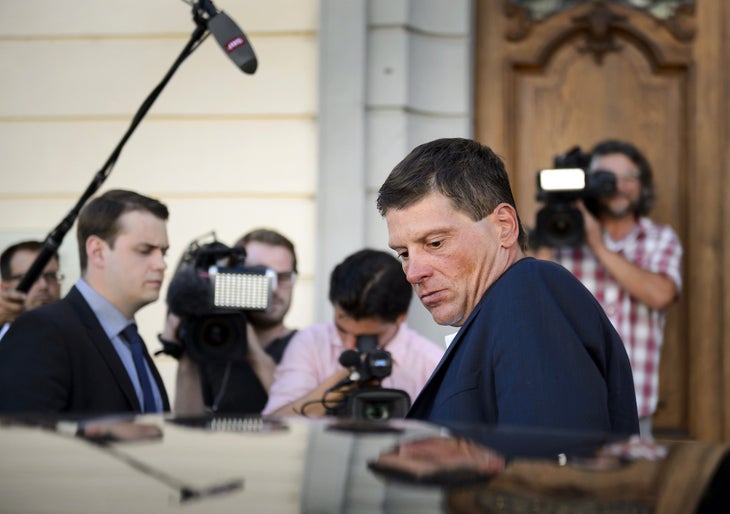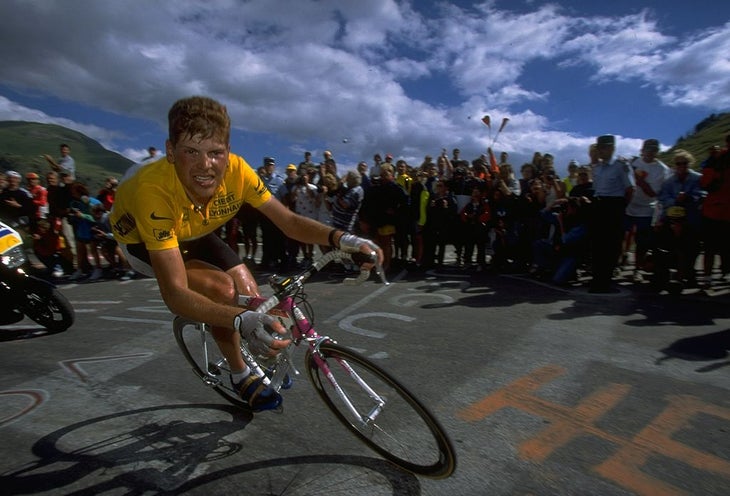Jan Ullrich is back in the headlines, and this time it’s for all the right reasons.
For the better part of the past two decades, the 1997 Tour de France winner was often at the center of a media maelstrom for all the wrong reasons.
Doping admissions, perp walks, DUI’s, racing bans, and personal anguish and professional downfalls both on and off the bike fed the media machine for Germany’s first and only yellow jersey winner.
By 2018, Ullrich was at a breaking point. More than a decade after retiring, a high-profile incident involving a prostitute who alleged he tried to strangle her and a run-in with a German actor in Mallorca nearly pushed “Der Kaizer” to the edge.
Luckily, Ullrich found salvation instead.
Ullrich admitted his woes that year in an honest and emotional public letter published in the German media and managed to come out clean and sober after a stint in a Miami rehab center.
Now three years later, a 47-year-old healthy and clean Ullrich is tip-toeing back into the public limelight.
Also read: Jan Ullrich and his journey from light to darkness
Last month, Ullrich made a pair of public appearances that confirmed he’s healthy again.
First, he joined former nemesis and fellow doping refugee Lance Armstrong on a podcast. And last month, he rode in a 300km-plus gran fondo on Mallorca.
“I’m finally back in the big cycling family,” Ullrich told journalists at Mallorca according to radsport-news.com. “I’m glad to see the old boys again. It’s been a long time since I’ve ridden 300km, maybe back in 2003. My energy is back, and the goal today is just to have fun.”
Clean and sober, back in the limelight again
The story of a smiling and fit Ullrich is the latest chapter in one of the most dramatic, torturous, and finally redemptive stories in cycling history.
A protege who won the Tour in 1997 at age 23, Ullrich was billed as the next five-time Tour de France winner. Yet he soon fell into a dark hole filled with the detritus of the EPO Generation.
After winning the amateur world title in 1993, the former East German barnstormed into the pro ranks, finishing second to Bjarne Riis in his 1996 Tour debut, and winning the next year on a trot.
Many predicted he would soon join the five-win yellow jersey club.
As Germany’s first Tour winner, he soon became a symbol of a proud and reunified country. German cycling was booming, and “Der Kaizer” led a generation of riders who took centerstage on the well-oiled Telekom team.
Things soon went off the rails, however. Ullrich suffered under the weight of expectations and struggled with his own weight, often going so soft in the off-season he’d have to burn himself out just to get into top shape for the Tour.
Injuries and misfires, as well as losses to Marco Pantani in 1998 and to Lance Armstrong in 2000, stopped him in his tracks at the Tour. After winning once, he’d never win again, and he would finish second five times in all.
Ullrich went on to win the Olympic gold medal at the 2000 Sydney Games and the world time trial title in 2001.
Then came the scandals, doping innuendos, injuries, miscues, and personal problems off the bike. Ullrich, long dogged by the German media, was linked to Operación Puerto in 2006, and was prevented, along with a host of others, from starting that year’s Tour.
By 2006, a humiliated Ullrich was all but washed up, and he never raced again, officially retiring in February 2007. Like just about everyone else in that era, he refused to admit to his cheating ways, boldly declaring in his final press conference, “I have never doped.”
Looking back, Ullrich admitted he struggled with the pressures and demands that came with cycling super-stardom.
“I had many ups and downs, and I guess I made a lot of mistakes. Maybe I was too young then to handle the pressure,” he told journalists in Mallorca. “But cycling is and will be my life. Especially here on Mallorca, a paradise, not just for cyclists. I don’t live here without a reason. I cycle a lot, have friends here. I’m a happy person again now.”

Finding a way out of a dark place
For years, Ullrich was hounded by German media and anti-doping authorities.
For a long time, Ullrich refused to admit his doping indiscretions. After leaving the sport in 2006, he seemed to lose his way and his personal life tumbled out of control.
There were several high-profile public incidents that underscored a personal spiral that many feared could end up for the worse. He split from two former wives and was involved in a drunk-driving incident.
Despite admitting in 2013 he blood-doped with Puerto ring-leader Eufemiano Fuentes, coming clean on his doping past didn’t seem to ease the pain. He later admitted he was lost in a haze of alcohol and drugs.
Also read:
When he did eventually admit to doping throughout much of his career, he remained defensive and insisted he wasn’t doing anything that the rest of his peers were not.
For riders of the EPO Era, many said they had no choice but to inject needles in their arms and pop pills in order to stay up and have any hope of winning. In the twisted rationale of the day, no one was cheating anyone if everyone else was doping.
Even today, a defiant Ullrich refuses to hand back his Olympic gold medal from 2000, and the IOC and other officials cannot do anything about it since it’s well beyond deadlines for official action or sanctions.
“Almost everyone at the time was taking performance-enhancing substances. I didn’t take anything that was not taken by the others,” Ullrich said at the time. “It would only have been cheating for me if I had gotten an advantage, which was not the case. I just wanted to ensure I had an equal opportunity.”
In 2018, Ullrich was arrested on the Mallorcan property of German actor Til Schweiger, and a prostitute later accused Ullrich of strangling her until she passed out. His second wife had already left him, and Ullrich was at the end of his tether.
Ullrich checked himself into a rehabilitation center, published a public letter in German media, and vowed to clean himself up.
“I learned a lot during the detox phase in Miami. I was surrounded by people with a similar fate and by very good therapists and doctors. I am now aware that I am ill for reasons that I do not want to go into today,” Ullrich wrote in 2018. “With the detox, I have built the foundation for my new life. If you will, I’ve mastered the first stages of my personal Tour de France.”
After staying sober for three years, Ullrich seems to be relishing his new start.
Last month, Ullrich made his first big public splash in a reunion with former nemesis Armstrong. The German joined Armstrong, George Hincapie, and former US Postal Service director Johan Bruyneel on a podcast that created headlines around the world.
“I was nearly like Pantani, I was nearly dead,” Ullrich said in the Armstrong podcast. “I’ve come back to life. My friends are bringing me back to life. I am very happy now.”
Like Ullrich, Armstrong was also publicly shamed after he was forced to admit that his seven yellow jerseys came after years of doping, all of which have been stripped from the Tour’s official record. Not that Armstrong had it any easier than Ullrich, but the Texan managed to better cope with the fallout.
Ullrich fell into depression and abused recreational drugs and alcohol, and finally ended up in a rehab center in Miami.
Armstrong went to visit him, and the two rekindled their unique relationship. Armstrong said Ullrich was the only rider in his era who truly challenged him, even if both of their racing legacies remain tarnished today.
There were many victims in the EPO Era, with several riders dying of overdoses, suicides, and other early demises. Pantani, of course, tragically died of a drug overdose in 2004, his friends and family unable to bring him back from the abyss.
Ullrich seems happy to have a second chance.

Returning to his roots
German fans and media seem to have warmed to the new-look Ullrich. Long a center of tabloid headlines, Ullrich is now quietly returning to public life.
A clean and sober Ullrich reunited with family and friends and returned to Germany as well as Mallorca, where he lives for part of the year. Ullrich also resumed riding and training on the road and is once again healthy and fit.
“God gave me this body and God gave me this talent and then I’m nothing or full gas,” Ullrich said in Mallorca. “I train every day, and I drink only water. I stopped alcohol and drugs three years ago. I live very healthily, and my girlfriend’s cooking very healthy food for me.”
Ullrich says he’s a fan of today’s generation of riders, and he’s back to watching the big races on TV after many years when it was too painful to be too close to the sport that he once dominated.
Last month, he met Tadej Pogačar in Paris following the 2022 Tour de France presentation.
“My generation was marked by doping and EPO,” he said. “Clean cycling is very beautiful.
“My great idol was, is, and will always be Miguel Indurain, he stands above all for me,” he said in Mallorca. “Currently, Peter Sagan, Julian Alaphillipe, Tadej Pogačar, and Tony Martin are among my favorites. Even if Tony now unfortunately stops. And Max Schachmann is also a great rider for me.”
Much like Armstrong’s impact on U.S. cycling, Ullrich remains a controversial figure.
His rise and fall continue to resonate across and divide the German cycling community. It remains to be seen how much of a public embrace Ullrich might receive, and if he will someday take a larger role in the sport.
Seeing Ullrich back on the bike and with a smile on his face, however, is something extraordinary for anyone who’s followed his many ups and downs over the past two decades.
«Tu m’as ramené à la vie» : Jan Ullrich remercie Lance Armstrong de l’avoir aidé pendant sa dépression https://t.co/VHvDlKalY8 via @le_Parisien
— Chris Runner (@Chris87Runner) October 31, 2021
